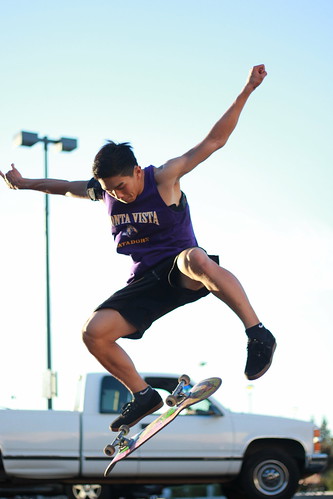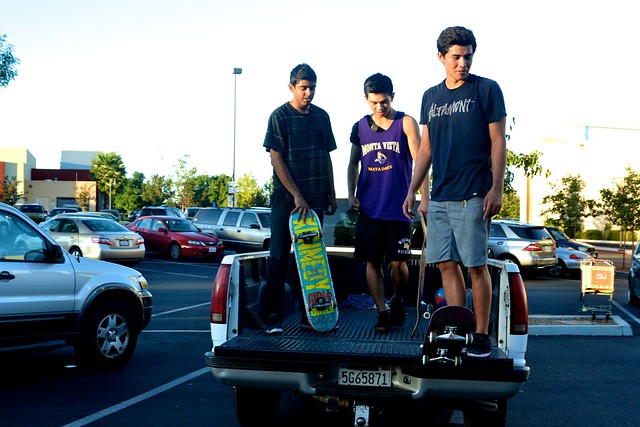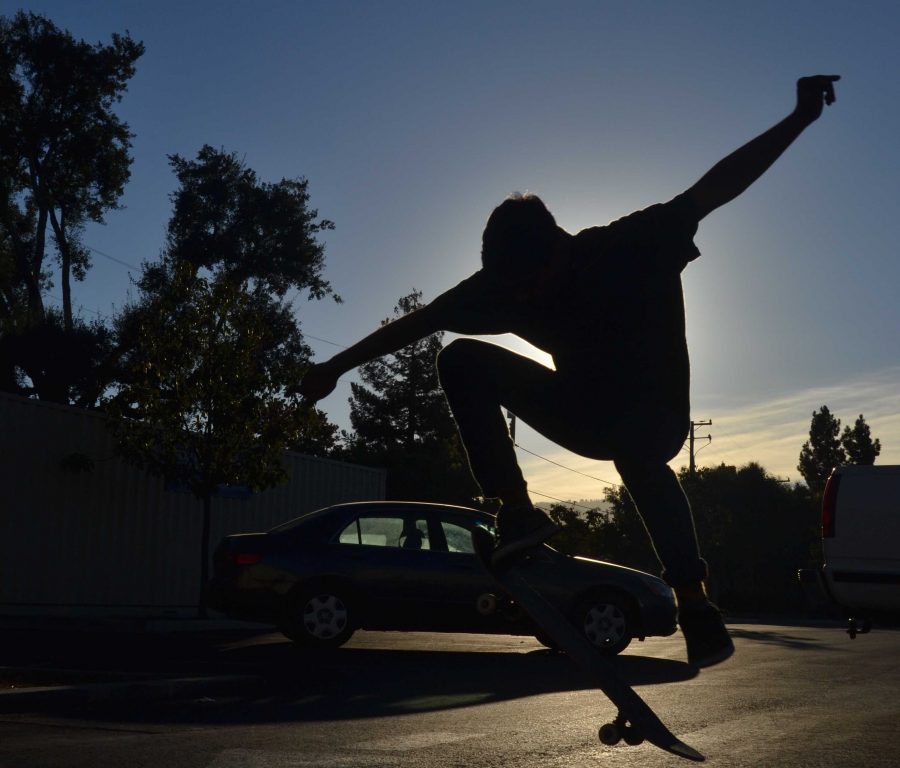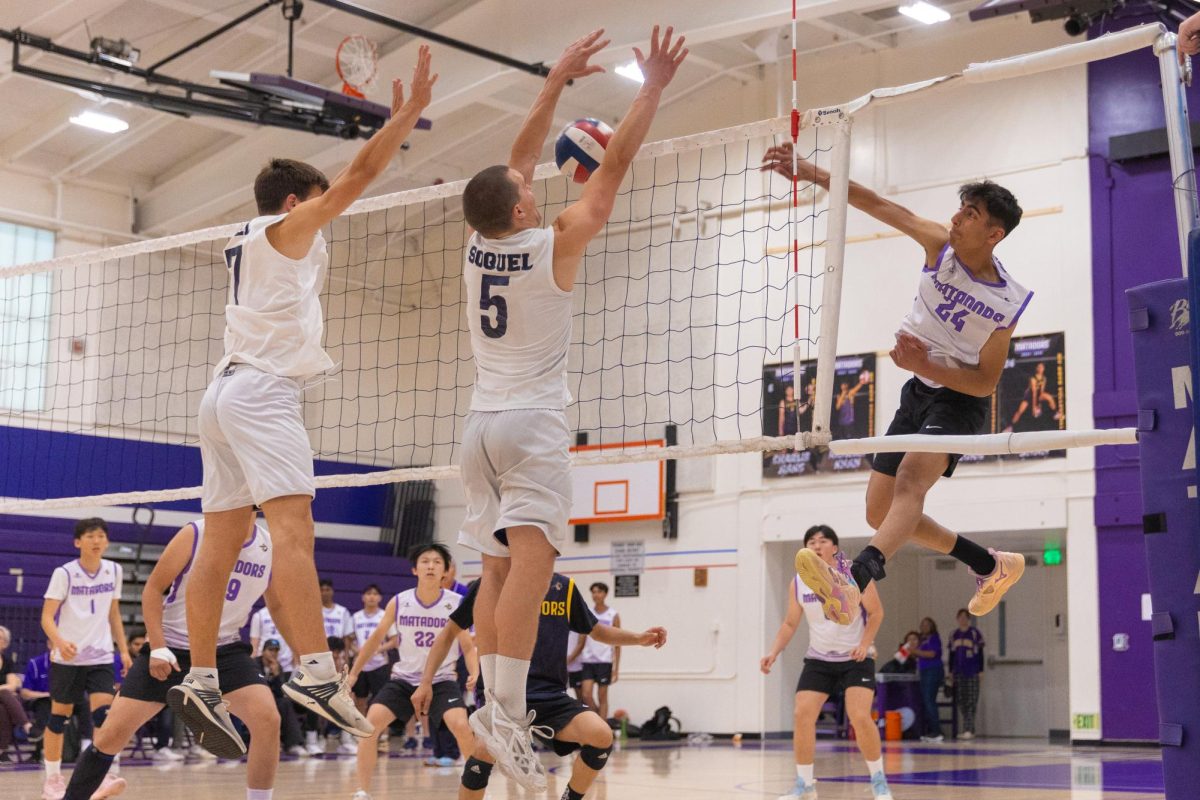Written by Karen Ma and Malini Ramaiyer
Click here for video coverage of the skaters.
Click here for an editorial on breaking the misconception on skaters.
One day during the summer of 2014, current junior Greg Ellis had been skating the rail and stairs at Fremont Skate Park when he saw current sophomore David Truong and his friend roll in, eating In-N-Out. They sat on a bench nearby and Truong yelled out to Ellis.
“Hey, you want some fries?” “I was so hungry at the time because I was skating all day, so I’m like, ‘Hell yeah!'” Ellis, who didn’t know Truong then, said. “I wasn’t screaming, but I was really happy.”
“You got to do a trick if you want them,” Truong said. “Noseslide the handrail.”
“I’ll noseslide the hubba,” Ellis said. Ellis noseslid the hubba, Truong gave him the fries — that moment at Fremont Skate Park was the beginning of their friendship.

After some small talk, Ellis found out that Truong would attend MVHS as a freshman for the upcoming year. Truong had moved from East San Jose to Cupertino on June 27, 2014 and Ellis was one of the first friends he made. Both Ellis and Truong were part of a skating culture developed by each of their groups of friends outside of MVHS — Ellis at Lawson Middle School and Truong in East San Jose. Last year, the two would skate during lunch at the McClellan Terrace parking lot. It was the most convenient spot for the allotted 45 minutes. In a community where skateboarding is rare, skaters have their own reasons for continuing the sport. Whether it’s to connect with friends, get a ride home or learn some new tricks, they find ways to make the sport a part of their daily lives. After entering MVHS, however, the two friends found it increasingly difficult to balance academics, other extracurricular activities and skateboarding. “Since high school, I took a lot of unexpected turns in my life,” Truong said. “I got talked into doing wrestling and football and it just consumes so much time, like now I barely have time to skate anymore.” Ellis described transitioning to MVHS as difficult because the new emphasis on academics was different from what he had faced at LMS. He believes that if he had gone to Cupertino High School along with his middle school friends, he wouldn’t have have developed the academic habits he currently has.
“Coming to [MVHS], I had nothing but one best friend and a skateboard freshman year,” Ellis said. “[MVHS] has made me a better student for sure. I’ve learned a lot of time management. It does get to a point where nowadays, my junior year, I don’t get a lot of time to skate anymore. But when I do, I definitely take advantage of that time.”
While Ellis and Truong no longer skate during lunch, some students incorporate skating into their everyday life. Freshman Anton Berndt throws his Loaded Tan Tien longboard in the back of his sister’s car on the way to school and lugs it around all day, occasionally rolling into class when he’s feeling restless. After school, Berndt longboards the way back home.
Berndt moved to Cupertino from Germany four years ago. His town was near a glacier and he recalls that in Germany, he and his friends would skate all the hills natural to the geography of his small town of 10,000. Coming to Cupertino, Berndt found that the sport isn’t as common, but he’ll go to his friend’s house every now and then to skate. They’d go up to Hunter’s Point and ride down the trails. Once while gliding down a trail up there, the skateboard slipped underneath Berndt and he ended up scarring his knee. The pain of bursitis under his kneecap was difficult for Berndt to recover from and now he admits that he takes skating easier than before.
“I was kind of scared of doing it again because it hurt a lot,” Berndt said. “I still like [skating] a lot. It’s just [that] I’m not going to try to go as hard. [I’ll] be more cautious about what I’m doing.”
Berndt prefers to keep skating as a utility but he still enjoys the daily ride back home.
“It just feels like you’re going fast. Even though you may not being going really fast, it’s just wind blowing in your face,” Berndt said. “[Skateboarding] just feels different — it’s like sidewalk surfing.”
Senior Shovik Guha also includes skating into his daily routine as a way to relax and to challenge himself. Guha, unlike Berndt, Truong and Ellis, didn’t start skating until high school. He and his friend were exploring Cupertino when they found 12xu, a now defunct skateboard shop. As a gymnast, Guha was already inclined to adventure so the decision to try skating wasn’t a difficult one.
“For every one time I land on the board, I probably fall like 10, 20 times. That’s one thing with skateboarding, it requires a lot of perseverance,” Guha said. “That’s why a lot of people don’t do it. They try it but they don’t stick around with it because they can’t handle the failure.”
Guha, Ellis, Truong and Berndt have all experienced their share of falls and they’re okay with it. Guha believes that a lot of people in Cupertino avoid skating because they need instant gratification that skating simply doesn’t provide.

Senior Shovik Guha, sophomore David Truong and junior Greg Ellis prepare to skate off of Ellis’ trunk. Photo by Malini Ramaiyer.
“No one’s good at skateboarding the first time they try it because it’s just a piece of wood on four wheels,” Guha said. “It’s not a natural thing to be able to do. Everyone is terrible the first time they try it.”
Ellis and Truong agree that in Cupertino, skating hasn’t taken off because many attach a negative stigma to the sport. According to these skaters, many students pursue organized campus sports — few attempt skating in fear of injuries and even fewer continue after failing several times.
“Some people try it and they immediately fall in love with it. Some people try it and they hate it completely. They hate falling, they hate getting hurt, they hate sweating, they hate actually trying,” Ellis said. “Just fear and being afraid of something. It’s common, like jumping down a certain set of stairs or grinding a certain handrail, trying a trick you’ve never done — it’s scary.”








